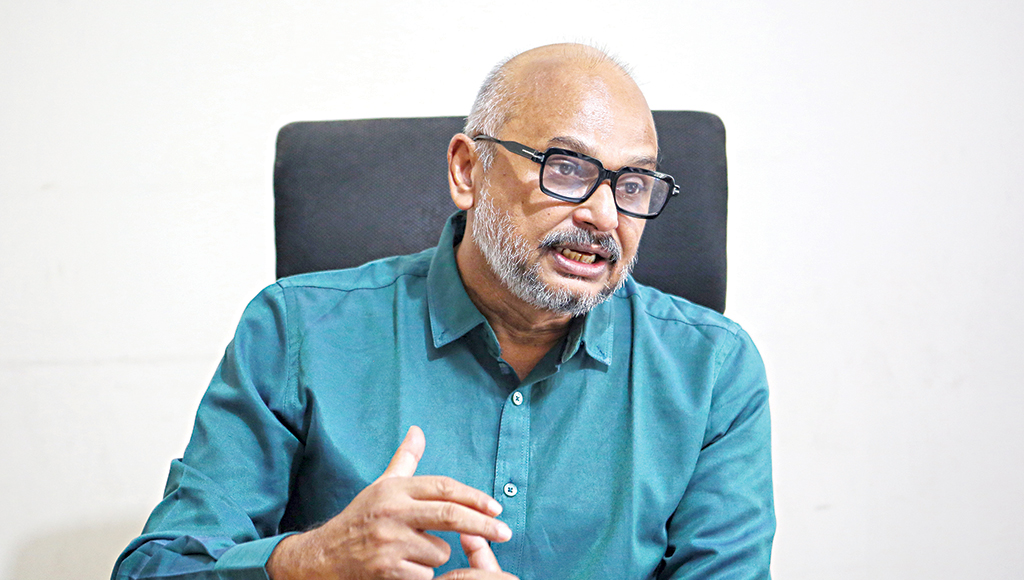
Dr Rashed Al Mahmud Titumir, a development economist and professor at the University of Dhaka, has called on the interim government to use the forthcoming budget as an outline for restoring democratic governance and reinforcing economic discipline. In an interview with New Age Business magazine, conducted by Special Correspondent Shakhawat Hossain, Dr Titumir has underscored the public’s demand for a rule-based system and has urged the government to provide clear indications on the timing of the next general election. He has also highlighted the need for strong action against oligarchic influence and for policy continuity to restore investor confidence. He has further advocated for unorthodox reforms, accountability for past governance failures, and a budget that honours the sacrifices made during the July–August uprising.
Professor of Economics Rashed Al Mahmud Titumir hopes that the interim government will focus on several pressing issues, including providing details of the next general election in the forthcoming national budget for the financial year beginning in July.
In a recent interview in the capital, Titumir placed significant emphasis on the transition to an elected government, referencing a statement made by the chief adviser of the interim government, Muhammad Yunus, in a nationwide address in December 2024. Yunus had stated that the next national election could be held sometime between the end of 2025 and the first half of 2026.
Titumir expressed hope that the finance adviser, Salehuddin Ahmed, would interpret the election timeline in the upcoming budget speech, thereby confirming that the next national budget would also be implemented by the newly elected government.
‘This is the budget subjected to the political government too,’ said Titumir, who is also a member of the board of directors of the central bank.
He emphasised the public’s aspiration for a smooth transition towards democracy, aided by the current government, which assumed power on 8 August — three days after Prime Minister Sheikh Hasina fled to India in the wake of a mass uprising that ended the Awami League’s 15-year rule.
Titumir, a former chairman of the Department of Development Studies at Dhaka University, was also critical of Hasina, accusing her of dismantling almost all institutions to extend her authoritarian rule.
He referenced the three controversial general elections held in 2014, 2018, and the most recent in 2024.
He further criticised the economic mismanagement during the previous political regime, citing the patronage of oligarchs, capital flight, loan defaults, foreign reserve depletion, and high inflation—all of which, he argued, left ordinary people in financial distress.
‘AL has wiped out gains the country obtained over the past 30 years since 1990,’ he said.
To address other pressing and lingering issues, Titumir expects the budget to include a ‘wish list’ that highlights the spirit of the July–August uprising.
Noting that the current government is a result of the sacrifices made by ordinary people during the July–August uprising, he said the finance adviser should present a wish list, at least in the annexure.
‘This will be the wish list of the toiling people who sacrificed lives to bring back order,’ he said, adding that the interim government would make commitments to advancing a rule-based system—meaning that nothing will occur through the violation of institutional rules.
This budget should demonstrate how fiscal discipline is being restored, he said.
In addition, Titumir expects standard measures to address persistent challenges such as inflation, resource mobilisation, private investment, employment, and the correction of national data.
According to him, inflation is pushing people below the poverty line, referencing reports published in the mainstream press.
A study report by the Bangladesh Institute of Development Studies, released in March 2025, stated that the proportion of poor households had risen in the country against the backdrop of persistent inflationary pressures over the past three years, along with both natural and man-made factors.
The proportion of poor households increased to 26.43 per cent in 2024, compared with 24.73 per cent in 2022.
The proportion of the extreme poor also rose to 6.63 per cent in 2024, compared with 6.06 per cent in 2022, according to the study report titled ‘Small Area Estimates of Poverty 2022: Trends and Disparities in Selected Districts, 2024’.
In a report published in April 2025, the World Bank warned that an additional three million people in Bangladesh were expected to fall into extreme poverty in 2025 due to a slowdown in economic activities and elevated inflation.
Dr. Rashed Al Mahmud Titumir said the social safety net programme under the national budget was riddled with inclusion errors, causing further hardship for the poor and needy.
He remarked that it would be highly interesting to observe how fiscal measures are shaped when both inflation and interest rates are high.
Although the overall inflation rate eased for a fifth consecutive month, it still remained high at 9.17 per cent in April. Overall inflation has been on a downward trend since December 2024, having peaked at 11.38 per cent in November. The 12-month average inflation between May 2024 and April 2025 was calculated at 10.21 per cent, slightly lower than the 10.26 per cent recorded between April 2024 and March 2025.
Emphasising the need for greater revenue mobilisation, which was severely affected during the previous regime due to politically motivated tax rebates to businesses and leakages in revenue collection, Titumir said a clear signal should be given to the public through the next budget.
‘The signal should be how the revenue mobilisation system is disciplined,’ he said.
He added that the next budget should also be used to send a clear message to investors that the newly elected government would uphold any strategies announced to boost private investment.
Noting that business confidence is crucial in an economy led by the private sector, he said the current government had been unable to attract significant private investment due to its limited timeframe.
However, it can still send the much-needed signal to businesses regarding the continuity of policy, he added, referring to newspaper reports highlighting declining private investment.
Private sector credit growth fell to 6.82 per cent in February, marking its lowest point in 21 years. Data from the Bangladesh Bank showed that this was the weakest growth since February 2004, when the rate stood at 14.4 per cent.
The downward trend began in November 2022, but the situation worsened amid political uncertainty following the change of government on 5 August 2024. This slowdown has affected industrial expansion, discouraged new investments, and limited employment opportunities.
In an update on quarterly GDP released in April, the Bangladesh Bureau of Statistics reported that the country achieved a 4.48 per cent growth rate during the October–December period of the current fiscal year.
This followed a slowdown to just 1.96 per cent in the first quarter of FY25, mainly due to disruptions in economic activity resulting from the July–August mass uprising.
Titumir said that, due to time constraints, major employment opportunities should not be expected under the interim government.
However, he hoped that the employment generation programme to be launched by the current government would be designed in such a way that the new elected government would be unable to suspend it.
Offering a number of recommendations—largely in line with those made by the Task Force in its report titled
‘Re-strategising the Economy and Mobilising Resources for Equitable and Sustainable Development’—he painted a bleak picture of the continuing unemployment situation.
According to him, high unemployment was one of the key factors that led students to revive the 2018 anti-quota movement in 2024, which eventually evolved into a broader anti-discrimination movement, resulting in the ousting of the Awami League.
Titumir called for greater focus on vocational training and skills development for the hundreds of thousands of young people entering the job market.
Most, he noted, are forced to settle for informal employment or work overseas, particularly in oil-rich Arab countries.
The informal sector continues to dominate employment in Bangladesh, with approximately 85 per cent of the workforce engaged in informal jobs — only a slight improvement from 89 per cent in 2013, according to the Task Force report.
The creation of employment opportunities is not only vital for providing livelihoods to young people but also essential for curbing rent-seeking behaviour, said Titumir.
‘Rent seeking activities will not stop if employment opportunities are not created,’ he said, referring to the growing number of unemployed youths, particularly those graduating from public and private universities.
Youth unemployment in Bangladesh remains a significant concern. While the national unemployment rate stood at only 3.25 per cent in 2023, the rate among individuals aged 15–29 was much higher, at 7.27 per cent. This figure is six times higher than the rate for those aged 30–64, according to the Task Force report.
The report also highlighted a related issue concerning the population classified as Not in Education, Employment, or Training (NEET). This group is predominantly composed of young males, and its size has doubled between 2017 and 2022.
Turning to the need for timely and accurate data—a topic of considerable debate following allegations of data distortion under the previous regime—Titumir said the new budget should include measures to correct nationally important data.
Without proper data, the much-needed redesign of the social safety net programme will remain incomplete, the economist said.
He explained that social protection is intended to safeguard individuals and households against vulnerabilities and risks that threaten their well-being, such as poverty, illness, unemployment, and old age.
Since 2015, the National Social Security Strategy (NSSS) has aimed to provide support at every stage of life for those in need.
However, despite its well-defined reform objectives and time-bound action plans, progress towards fulfilling the vision of the NSSS has significantly lagged behind expectations, according to the Task Force’s findings.
The report also pointed to issues such as programme fragmentation, targeting errors in beneficiary selection, limited resources, and ongoing dependence on development partners as contributing factors.
Titumir noted that another key expectation from the budget, though by no means the least, is the introduction of initiatives to improve the efficiency of the bureaucracy.
Without such reforms, the overall implementation of the budget will not improve, even though large sums are spent on running the administration.
He observed that a substantial portion of the budget is financed through borrowing from both domestic and foreign sources, referencing the mounting debt burden already weighing heavily on the nation.
In the financial year 2023–24, Bangladesh’s external debt repayment doubled to $6.07 billion, up from $3.0 billion in 2013–14, according to the Economic Relations Division’s annual publication Flow of External Resources into Bangladesh.
Meanwhile, total domestic debt rose to Tk 10,20,205 crore by June 2024, up from Tk 1,56,625 crore in 2013–14, according to the finance division’s debt bulletin.
The total size of the operating budget—most of which is allocated to running the administration and repaying debt—stands at Tk 5,06,900 crore for 2024–25, up from Tk 1,56,621 crore in 2013–14.
The development budget has reached Tk 2,16,000 crore in FY25, compared to Tk 65,870 crore in 2013–14. This reflects that the much-needed development spending on health, education, and social safety net programmes has not increased in line with expectations, despite hopes that the country would gradually evolve into a welfare state.
Titumir, however, remains optimistic about the country’s future—not only because of the nation’s resilience in the face of escalating natural disasters but also because of the people’s growing intolerance towards authoritarian tendencies.
‘People are giving a signal to the political parties that govern based upon rules and institutions or face doom,’ he said, reflecting on the country’s political unrest over the past two and a half decades.
‘Look at 1990, someone was thrown to jail,’ he said.
In December 1990, military dictator Hussain Muhammad Ershad was forced to resign after demonstrators clashed with security forces, destabilising his nine-year rule.
The opposition had long refused to recognise his regime, denouncing it as autocratic and corrupt. They launched a fresh movement to demand free elections and Ershad’s resignation.
Shortly after stepping down, Ershad was arrested and charged with multiple offences, including gold trafficking and embezzlement of public funds.
‘But in 2024, someone had to flee the country,’ said Titumir.
On 5 August 2024, Prime Minister Sheikh Hasina fled the country, ending her 15-year rule amid a dramatic student-led mass uprising against her authoritarian governance.
She departed her official residence, Ganabhaban, by military helicopter alongside her sister, Sheikh Rehana, en route to India.
Shortly afterwards, thousands of jubilant citizens stormed the premises, with some climbing atop a statue of Sheikh Mujibur Rahman, the country’s founding president.
Since forming her government in January 2009, Hasina had consistently dismissed both local and international criticism regarding her rule.
Accusations included serious human rights violations, curtailing freedom of expression, enacting repressive laws, engaging in massive corruption, dismantling democratic institutions, and destroying the electoral system.
She rejected all political demands for fair elections. In the 2014 general election, 153 lawmakers were elected unopposed due to a complete opposition boycott. The 2018 election saw ballot boxes allegedly filled long before voting commenced, while the 2024 general election was widely described as a sham.
Hasina also ordered a heavy-handed crackdown on students and protesters from the Student Movement Against Discrimination—a platform originating from the anti-quota protests—when they demanded reforms to the public service quota system. Approximately 1,500 people were reportedly killed during the July–August uprising.
The professor of Economics said that the messages from the people were loud and clear: if a government does not uphold a rule-based system, fails to work for the majority, and instead serves oligarchic interests, it will face dire consequences.
‘If you are not bringing any proper reform and failing to generate employment, you have no right to stay in power,’ he added.
In his view, the people also want a meaningful foreign policy that secures the country’s rightful share in the Bay of Bengal.
They want assurance that the South Asian Regional Cooperation, initiated by Bangladesh, is not dominated or hijacked by any particular country.
He continued that the people of Bangladesh also wanted to see the country join the Association of Southeast Asian Nations and become a vital partner to its eastern neighbours.
‘Thriving with Ummah relations with western counties with dignity,’ he said.
Titumir urged the public to be realistic about the capacity of the interim government to address the many challenges it faces, considering that it inherited a struggling economy due to the misgovernance of the previous regime.
Focusing on the economy and the political process, he said the Awami League regime had survived by distributing patronage at every level.
Describing it as a ‘resources-dependent syndicate,’ he claimed that in order to support this network, the regime created a level of debt unparalleled in the country’s history.
Between 2009 and 2023, foreign debt increased by over 300 per cent. In contrast, private investment stagnated and inequality grew, he said.
Criticising both domestic and international commentators who portrayed Bangladesh’s growth under the Awami League as a model for other countries, he dismissed the narrative as a mirage.
He rejected the growth story promoted by AL sympathisers, saying that whatever investment was made during the past regime went into creating ‘Begum Paras’ in Canada and purchasing apartments in the United Kingdom.
Acknowledging the limitations of the interim government, Titumir noted that it had not yet been able to revise the budget.
He said he hoped the recovery of stolen assets would set a precedent, alongside the restoration of discipline in the banking sector.
He also expected steps to curb the power of oligarchs and ensure policy predictability to foster investment.
Titumir advised the current government to adopt unorthodox approaches in dealing with monetary and fiscal issues, warning that due to long-standing structural problems and the absence of reforms during the previous regime, orthodox policies would prove almost dysfunctional.





